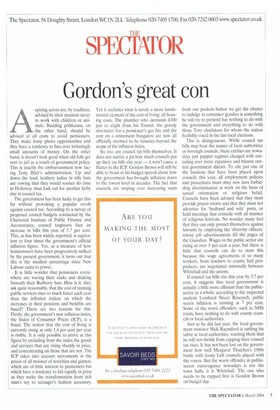Gordon's great con
Aspiring actors are, by tradition, advised by their mentors never to work with children or animals. Budding politicians, on the other hand, should be advised at all costs to avoid pensioners. They make lousy photo opportunities and they have a tendency to fuss over irritatingly small amounts of money. On the other hand, it doesn't look good when old folk get sent to jail as a result of government policy. This is exactly the embarrassment now facing Tony Blair's administration. Up and down the land, leathery ladies in silly hats are vowing that they would sooner do time in Holloway than fork out for another hefty rise in council tax.
The government has been lucky to get this far without provoking a popular revolt against council tax. According to a survey of proposed council budgets conducted by the Chartered Institute of Public Finance and Accountancy, council taxpayers face an increase in bills this year of 5.7 per cent. This, as has been widely reported, is equivalent to four times the government's official inflation figure. Yet, as a measure of how homeowners have been progressively milked by the present government, it turns out that this is the smallest percentage since New Labour came to power.
It is little wonder that pensioners everywhere are waving their sticks and shaking beneath their Burberry hats. How is it, they ask quite reasonably, that the cost of running public services rises so much faster each year than the inflation indices on which the increases in their pensions and benefits are based? There are two reasons for this. Firstly, the government's new inflation index, the Index of Consumer Prices (ICP), is a fraud. The notion that the cost of living is currently rising at only 1.4 per cent per year is risible. It is only possible to arrive at this figure by excluding from the index the goods and services that are rising sharply in price, and concentrating on those that are not. The ICP takes into account movements in the prices of all manner of novelties and gizmos, which are of little interest to pensioners but which have a tendency to fall rapidly in price as they make the transformation from rich man's toy to teenager's fashion accessory. Yet it excludes what is surely a more fundamental element of the cost of living: all housing costs. The plumber who demands £100 just to alight from his Transit, the greedy slot-meter for a pensioner's gas fire and the rent on a retirement bungalow are now all officially deemed to be luxuries beyond the scope of the inflation index.
So, too, are council tax bills themselves. It does not matter a jot how much councils put up their tax bills this year — it won't cause a flutter in the ICP. Gordon Brown will still be able to boast in his budget speech about how the government has brought inflation down to the lowest level in decades. The fact that councils are swiping ever increasing sums from our pockets before we get the chance to indulge in consumer goodies is something he will try to pretend has nothing to do with the government and everything to do with those Tory charlatans for whom the nation foolishly voted in the last local elections.
This is disingenuous. While council tax bills may bear the names of local authorities or borough councils, these entities are nowadays just puppet regimes charged with executing ever more expensive and bizarre central government diktats. To cite just one of the burdens that have been placed upon councils this year, all employment policies and procedures must obey new laws forbidding discrimination at work on the basis of sexual orientation or religious belief. Councils have been advised that they must provide prayer rooms and that they must not advertise for 'husband and wife' posts, or hold meetings that coincide with all manner of religious festivals. No wonder many feel that they can only protect themselves against lawsuits by employing the 'diversity officers' whose job advertisements fill the pages of the Guardian. Wages in the public sector are rising at over 5 per cent a year, but there is little that councils can do to stem this because the wage agreements of so many workers, from teachers to county hall penpushers, are negotiated nationally between Whitehall and the unions.
If council tax bills rise this year by 5.7 per cent, it suggests that local government is actually a little more efficient than the publicsector as a whole: according to the respected analysts Lombard Street Research, public sector inflation is running at 7 per cent. Some of the worst offenders, such as NHS trusts, have nothing to do with county councils or local authorities.
Just as he did last year, the local government minister Nick Raynsford is rattling his sabre at local authorities, warning them that he will not shrink from capping their council tax rises. It has not been lost on the government how well Margaret Thatcher's 1980s battle with loony Left councils played with the voters. But the worst offender in publicsector extravagance nowadays is not the town halls, it is Whitehall. The one who needs to be capped first is Gordon Brown on budget day.


















































































 Previous page
Previous page